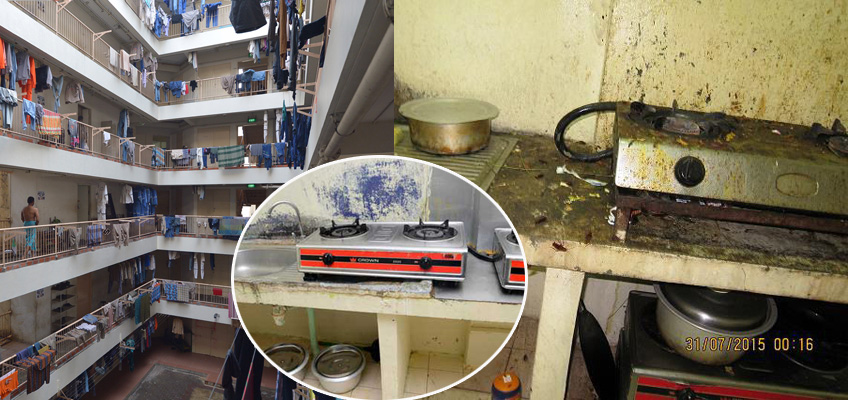Dirty and cramped sleeping areas with clothes strewn all over, garbage littered over the floor, and cockroaches crawling on table tops.
This was the condition of an overcrowded dormitory in Boon Lay.
On Tuesday, dormitory operator KT Mesdorm was fined the maximum $300,000 for housing foreign workers in overcrowded accommodation at its Blue Stars Dormitory.
KT Mesdorm, which pleaded guilty to 30 charges, was the first dormitory operator to be prosecuted and convicted in court under the Employment of Foreign Manpower Act.
The dormitory, which was built in 2001, was packed with more than 500 workers over the allowed limit of 4,500.
The Ministry of Manpower yesterday released photos taken last July of the dormitory’s poor living conditions, which it said severely compromised the health and well-being of the workers living there.
A spokesman for KT Mesdorm told The New Paper yesterday that it immediately took steps to rectify the living conditions.
“KT Mesdorm acknowledges there were lapses, and we immediately took affirmative steps and rectified the situation and living conditions of the workers,” said its spokesman.
He claimed the overcrowding happened because companies had asked it to house their workers on a “temporary basis”. But the dormitory now keeps strictly to the stipulated limit.
He added that pest controllers were hired, and that KT Mesdorm actively educates the workers on proper hygienic practices.
TNP visited the Blue Stars Dormitory yesterday.
The premises consist of seven blocks, each six storeys high with about 10 units on each level.
Each unit had its own cooking and dining area, and toilets.
There was also a basketball court, supermarket and remittance centre in the compound.
Shipyard worker Amirul Islam, 27, who arrived from Bangladesh about 10 months ago – which was around the time the dormitory was found to be overcrowded – said conditions have since improved.
SHIFTED OUT
“We used to have 16 people in our unit. It was crowded. But now, four people have been shifted out.
“There’s more space for everyone now,” he said.
His roommate and colleague, Mr Chinnarao, 28, an Indian national, agreed.
“It’s much better now. Last time, there even used to be two beds in the dining area. Now, no more,” he said.
The living quarters were a far cry from the photographs taken last July.
For example, the living and cooking areas in each unit had been scrubbed clean since.
There was also no litter accumulating at the rubbish chute area, as seen in the photographs.
Mr Rajib Mohammad, 31, also a shipyard worker from Bangladesh, said the occupants do their best to clean the place from time to time.
When shown last July’s photographs, Mr Rajib shook his head and said: “I am very unhappy.
“This is done by some people, who are stupid.
“Maybe they get drunk and they anyhow throw their rubbish. But this doesn’t happen every day.”
Another shipyard worker, Mr Gahil Abdul, 42, who has been living at the dormitory for four years, said he and his fellow occupants take turns cleaning the premises.
“We also don’t want to live in a dirty place,” he said.
Overcrowded dorms have consequences
Overcrowding in dormitories can have grave consequences for both foreign workers and Singaporeans, two migrant workers advocacy groups told The New Paper.
News of Blue Stars Dormitory’s $300,000 fine did not come as a surprise to organisation Transient Workers Count Too (TWC2).
“Many purpose-built dormitories are run on a commercial basis. If they can make greater profit by cramming in more people, they will try,” said TWC2 treasurer Alex Au.
But it is fortunate that the case came to light, as it signals to other dormitory operators that the Ministry of Manpower (MOM) strongly frowns upon overcrowding, he added.
The advocacy groups do not have figures of dormitory overcrowding cases here, Mr Au said.
“Workers rarely risk their jobs to be whistleblowers. If employers terminate their contracts, they have to pay the agent fees again if they want to look for another job,” he explained.
He said living conditions will improve when dormitory operators open their doors for inspection.
“If they wish to establish a good reputation and brand name, they might want to distinguish themselves by saying, ‘We have nothing to hide and you can take a look inside because we have decent standards’,” said Mr Au.
Although fines and hiring restrictions are appropriate punishments for errant companies, operating costs are still an issue, said Mr Jolovan Wham, a social worker at Humanitarian Organisation for Migration Economics.
“Instead of increasing the foreign worker levy, the Government should consider encouraging employers to channel more funds towards improving the welfare of workers,” he said.
Poor living conditions, such as overcrowding, carry deeper consequences for society as well, the advocacy groups said.
PRODUCTIVITY
“These conditions affect productivity and the mental alertness of workers. They’re closely related to work safety,” said Mr Wham.
Mr Au said: “Overcrowding has life and death consequences, and these are totally invisible to the public.”
Mr Wham said it is usually a case of “out of sight, out of mind” when it comes to overcrowded foreign worker dormitories here.
“There isn’t much awareness about the situation. It’s not something that many people know about because these dormitories are situated in remote parts of Singapore,” he said.
He added that foreign worker rights are important.
“It is a reflection of who we are as a society. Upholding their dignity is the decent thing to do.”
rloh@sph.com.sg
prisang@sph.com.sg

This article was first published on June 2, 2016.
Get The New Paper for more stories.







































